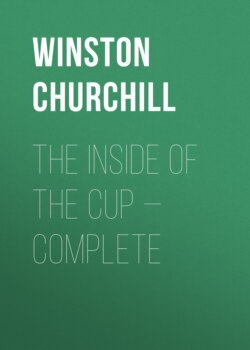Читать книгу The Inside of the Cup — Complete - Winston Churchill - Страница 8
На сайте Литреса книга снята с продажи.
Оглавление“Fill me, radiancy divine,
Scatter all my unbelief!”
Visions of the Crusades rose before him, of a friar arousing France, of a Maid of Orleans; of masses of soiled, war-worn, sin-worn humanity groping towards the light. Even after all these ages, the belief, the hope would not down.
Outside, a dismal February rain was falling, a rain to wet the soul. The reek of damp clothes pervaded the gallery where he sat surrounded by clerks and shop girls, and he pictured to himself the dreary rooms from which they had emerged, drawn by the mysterious fire on that altar. Was it a will-o'-the-wisp? Below him, in the pews, were the rich. Did they, too, need warmth?
Then came the sermon, “I will arise and go to my father.”
After the service, far into the afternoon, he had walked the wet streets heedless of his direction, in an exaltation that he had felt before, but never with such intensity. It seemed as though he had always wished to preach, and marvelled that the perception had not come to him sooner. If the man to whom he had listened could pour the light into the dark corners of other men's souls, he, John Hodder, felt the same hot spark within him—despite the dark corners of his own!
At dusk he came to himself, hungry, tired, and wet, in what proved to be the outskirts of Harlem. He could see the place now: the lonely, wooden houses, the ramshackle saloon, the ugly, yellow gleam from the street lamps in a line along the glistening pavement; beside him, a towering hill of granite with a real estate sign, “This lot for sale.” And he had stood staring at it, thinking of the rock that would have to be cut away before a man could build there—and so read his own parable.
How much rock would have to be cut away, how much patient chipping before the edifice of which he had been dreaming could be reared! Could he ever do it? Once removed, he would be building on rock. But could he remove it? … To help revive a faith, a dying faith, in a material age—that indeed were a mission for any man! He found his way to an elevated train, and as it swept along stared unseeing at the people who pushed and jostled him. Still under the spell, he reached his room and wrote to the lawyer thanking him, but saying that he had reconsidered coming to New York. It was not until he had posted the letter, and was on his way back to Cambridge that he fully realized he had made the decision of his life.
Misgivings, many of them, had come in the months that followed, misgivings and struggles, mocking queries. Would it last? There was the incredulity and amazement of nearest friends, who tried to dissuade him from so extraordinary a proceeding. Nobody, they said, ever became a parson in these days; nobody, at least, with his ability. He was throwing himself away. Ethics had taken the place of religion; intelligent men didn't go to church. And within him went on an endless debate. Public opinion made some allowance for frailties in other professions; in the ministry, none: he would be committing himself to be good the rest of his life, and that seemed too vast an undertaking for any human.
The chief horror that haunted him was not failure—for oddly enough he never seriously distrusted his power, it was disaster. Would God give him the strength to fight his demon? If he were to gain the heights, only to stumble in the sight of all men, to stumble and fall.
Seeming echoes of the hideous mockery of it rang in his ears: where is the God that this man proclaimed? he saw the newspaper headlines, listened in imagination to cynical comments, beheld his name trailed through the soiled places of the cities, the shuttlecock of men and women. “To him that overcometh, to him will I give of the hidden manna, and I will give him a white stone, and upon the stone a new name written, which no one knoweth but he that receiveth it.” Might he ever win that new name, eat of the hidden manna of a hidden power, become the possessor of the morning star?
Unless there be in the background a mother, no portrait of a man is complete. She explains him, is his complement. Through good mothers are men conceived of God: and with God they sit, forever yearning, forever reaching out, helpless except for him: with him, they have put a man into the world. Thus, into the Supreme Canvas, came the Virgin.
John Hodder's mother was a widow, and to her, in the white, gabled house which had sheltered stern ancestors, he travelled in the June following his experience. Standing under the fan-light of the elm-shaded doorway, she seemed a vision of the peace wherein are mingled joy and sorrow, faith and tears! A tall, quiet woman, who had learned the lesson of mothers—how to wait and how to pray, how to be silent with a clamouring heart.
She had lived to see him established at Bremerton, to be with him there awhile. …
He awoke from these memories to gaze down through the criss-cross of a trestle to the twisted, turbid waters of the river far below. Beyond was the city. The train skirted for a while the hideous, soot-stained warehouses that faced the water, plunged into a lane between humming factories and clothes-draped tenements, and at last glided into semi-darkness under the high, reverberating roof of the Union Station.
